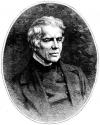The prayers are o'er: why slumberest thou so long,
Thou voice of sacred song?
Why swell'st thou not, like breeze from mountain cave,
High o'er the echoing nave,
This white-robed priest, as otherwhile, to guide,
Up to the Altar's northern side? -
A mourner's tale of shame and sad decay
Keeps back our glorious sacrifice to-day:
The widow'd Spouse of Christ: with ashes crown'd,
Her Christmas robes unbound,
She lingers in the porch for grief and fear,
Keeping her penance drear, -
Oh, is it nought to you? that idly gay,
Or coldly proud, ye turn away?
But if her warning tears in vain be spent,
Lo, to her altered eye this Law's stern fires are lent.
Each awful curse, that on Mount Ebal rang,
Peals with a direr clang
Out of that silver trump, whose tones of old
Forgiveness only told.
And who can blame the mother's fond affright,
Who sporting on some giddy height
Her infant sees, and springs with hurried hand
To snatch the rover from the dangerous strand?
But surer than all words the silent spell
(So Grecian legends tell)
When to her bird, too early 'scaped the nest,
She bares her tender breast,
Smiling he turns and spreads his little wing,
There to glide home, there safely cling.
So yearns our mother o'er each truant son,
So softly falls the lay in fear and wrath begun.
Wayward and spoiled she knows ye: the keen blast,
That braced her youth, is past:
The rod of discipline, the robe of shame -
She bears them in your name:
Only return and love. But ye perchance
Are deeper plunged in sorrow's trance:
Your God forgives, but ye no comfort take
Till ye have scourged the sins that in your conscience ache.
Oh, heavy laden soul! kneel down and hear
Thy penance in calm fear:
With thine own lips to sentence all thy sin;
Then, by the judge within
Absolved, in thankful sacrifice to part
For ever with thy sullen heart,
Nor on remorseful thoughts to brood, and stain
This glory of the Cross, forgiven and cheereth in vain.






